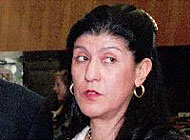Helping poorer nations be heard at the WTO

A Geneva-based agency, funded by the Swiss government, helps poor countries make their voices heard at the World Trade Organisation.
The handful of employees at the Agency for Trade Information and Cooperation (AITIC) have had a lot on their hands in the run-up to the ministerial conference of the World Trade Organisation (WTO) in Doha, Qatar.
Trade delegations from developing countries have been seeking the help of AITIC to clarify a point on the Doha agenda, or obtain data to underpin an intervention they want to make.
AITIC’s director, Esperanza Durán, says governments of poorer nations are taking a more active role in negotiating a new round of trade talks than they did during the Uruguay round of talks from 1991 to 1994.
“At that time what I call the less advantaged countries ended up signing an agreement many of them didn’t know much about what it entailed.”
The loose notion of “less advantaged countries” (or LACs), a term created by Durán, has become official AITIC parlance.
It combines the 48 least developed countries (LDCs) as defined by the United Nations, as well as smaller developing countries (such as Venezuela) and countries in transition, such as the formerly communist central Asian nations.
Defending countries’ interests
AITIC was established by the Swiss government in 1998 to improve the capacity of LACs to defend their interests during world trade negotiations. Durán says this is especially true for “non-resident” WTO member states – those that can’t afford to have a permanent trade mission in Geneva.
Of the 142 WTO member states, 37 have non-resident status. All of them are poorer nations in Africa, Central Asia or Latin America which deal with the WTO from embassies in Paris, London or Bonn – if at all.
AITIC is located near the WTO to one side of a floor in an unassuming office block. With an annual budget of SFr1.5 million, which is funded by the Swiss state secretariat for economic affairs, and only four full-time employees, Durán says the agency is “exceptionally efficient”.
“The other day a trade diplomat arrived from abroad and asked if we could provide him with an English language outline of a complicated trade issue he needed to negotiate over at the WTO,” Durán recalls.
“We said ‘sure, when do you need it?’ He said, ‘well, actually, by tonight’. Some things seem impossible, but we still do them – we did in that case, anyway.”
Reference library
She says the simple reason for many of the difficulties poorer nations are facing is the WTO’s shortage of interpreters, who fail to translate documents into all of the organisation’s three official languages, English, French and Spanish.
AITIC has a reference library, meeting and reading rooms, and on-line stations. But the main attraction is the personalised assistance the agency’s expert staff provides on request.
AITIC staff also answer requests that arrive by e-mail or fax, as in a recent handwritten fax note from an African capital that asked for documents in preparation for a seminar aimed at officials in that country’s ministry of trade.
No charge
All of the agency’s assistance is free of charge.
AITIC also provides meeting rooms and a neutral ground for informal discussions among trade delegates. “The more they find out about international trade, the more they take common positions”, Durán says.
An example is a new system of customs valuation that WTO members agreed in 1994. It should be in place shortly, the transitional period coming to an end. “Less advantaged countries all have a major difficulty with the agreement – they lack the resources needed, such as computers and trained staff.”
This and similar problems with the implementation of the decisions that ended the Uruguay round of talks are a priority at this weekend’s Doha summit.
Another issue where developing countries will show a common interest are the parameters for a future round of trade talks, with subsidies for agriculture in industrialised nations the main sticking point.
Durán, who has been teaching at the London School of Economics and in her native Mexico, is convinced the growth in international trade offers more opportunities to less advantaged countries than perils.
“Globalisation is a fact of life whether we like it or not. All we can attempt to do is help the less advantaged nations to integrate in that growing market.”
by Markus Haefliger

In compliance with the JTI standards
More: SWI swissinfo.ch certified by the Journalism Trust Initiative
You can find an overview of ongoing debates with our journalists here . Please join us!
If you want to start a conversation about a topic raised in this article or want to report factual errors, email us at english@swissinfo.ch.